
A person earns 70% of the active vocabulary of his native language before the age of 18. And after 33 years, the memorization of new words practically stops.
But this does not mean that after 33 you will not be able to learn foreign languages. In fact, age is secondary, and only two factors are really important. Read about them in the article.
We analyzed the results of an entertaining study of English vocabulary, which was attended by over 2 million people: native speakers and those who learn English as a foreign language.
Spoiler alert: A four-year-old native speaker already knows more words than most English language learners.
Now let's analyze the results in detail.
Vocabulary research that took three years
First, we recommend checking your vocabulary. So that you can immediately compare the eigenvalues with statistics.
It will take no more than five minutes. Here is the link:
http://testyourvocab.com/
Now let's go through the research itself. The test rules are extremely simple, but a certain level of honesty is required here. Only those words whose meaning you know exactly should be ticked.
“I've heard something like this, met somewhere, I'm not sure, but I will note” - such answers blur the true result.
But we will assume that everything here is fair and the results are not far from the absolute truth.
The Truth About Native Speaking Vocabulary
Most adult native English speakers have a vocabulary of 20,000 to 35,000 words. The median runs over 25,000–32,000 words, depending on age.
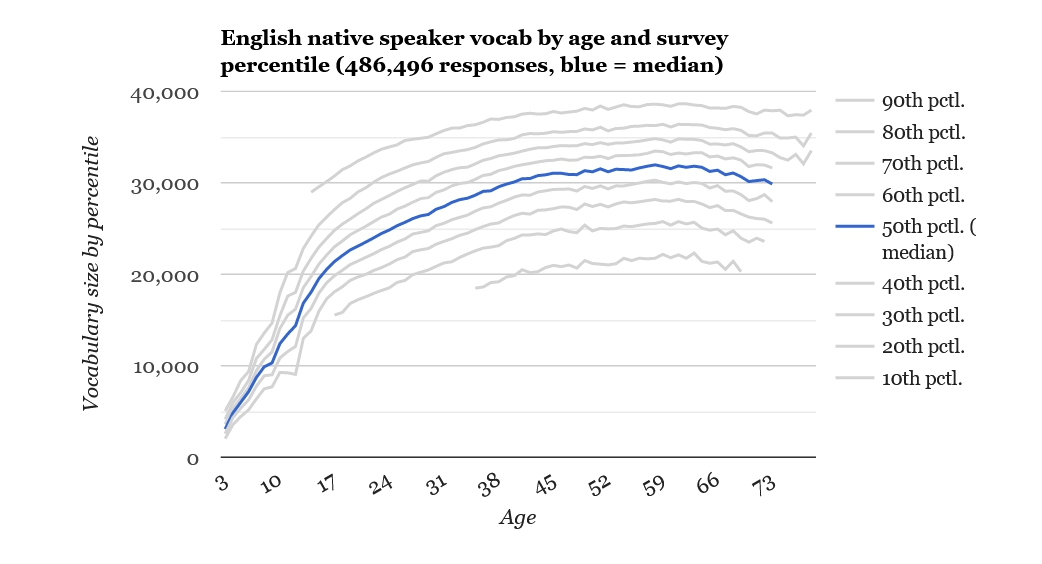
Interestingly, the most active vocabulary acquisition among native speakers is up to 18–20 years old. Then the process slows down and almost stops by the age of 33.
In many ways, native vocabulary size depends on childhood habits. After all, 2/3 of all words in life are studied by a person under the age of 13.
And reading habits at this age affect the formation of vocabulary most of all. So much so that the vocabulary of a person who does not read at all and a person who reads a lot of fiction will differ 2-3 times.
, 33- , , 11 000 . , , 30 000 .
Non-reading people practically do not gain vocabulary after 15 years. This means that even for native speakers, reading is the most important tool for developing speech and working with language.
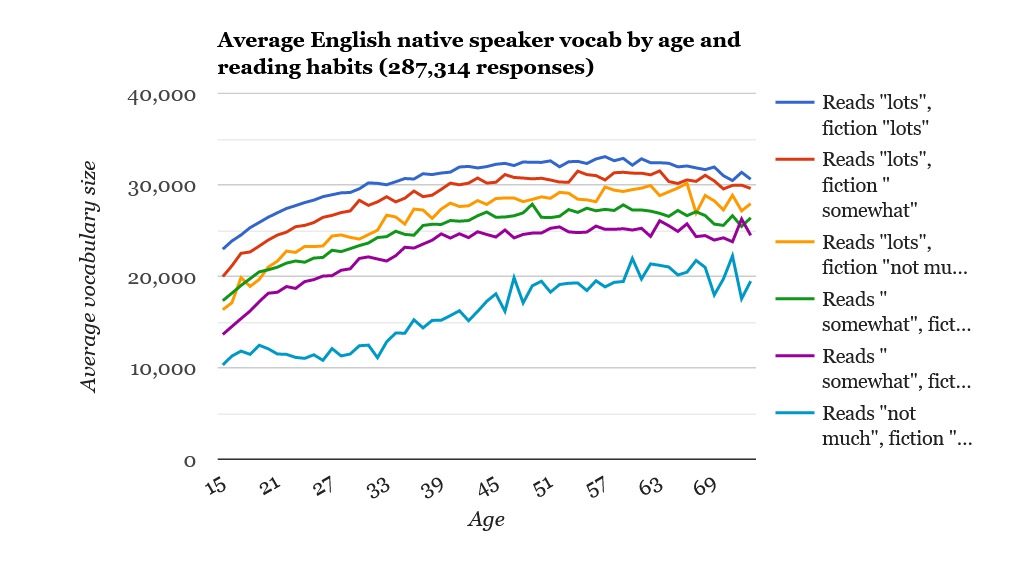
At the same time, already at the age of four, the child's vocabulary corresponds to the average vocabulary of a person who learns English as a second.
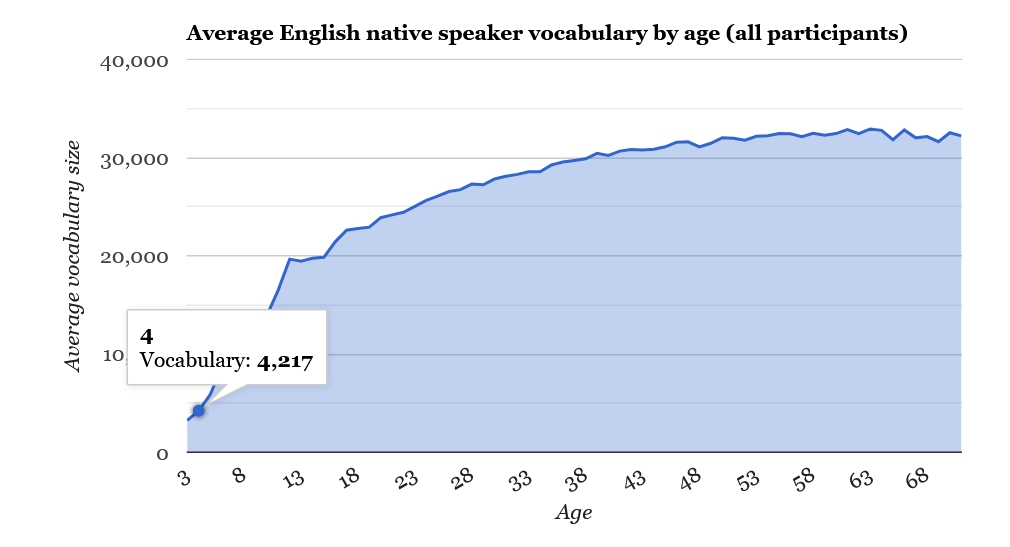
Reading plays a much more important role in the development of vocabulary than all other activities of the child combined.
Children who love to read learn four new words a day on average. And children who do not read at all only get one and a half words a day.
This graph shows how much vocabulary varies. Already at the age of 4–5 years, the difference is simply colossal - almost 2 times.
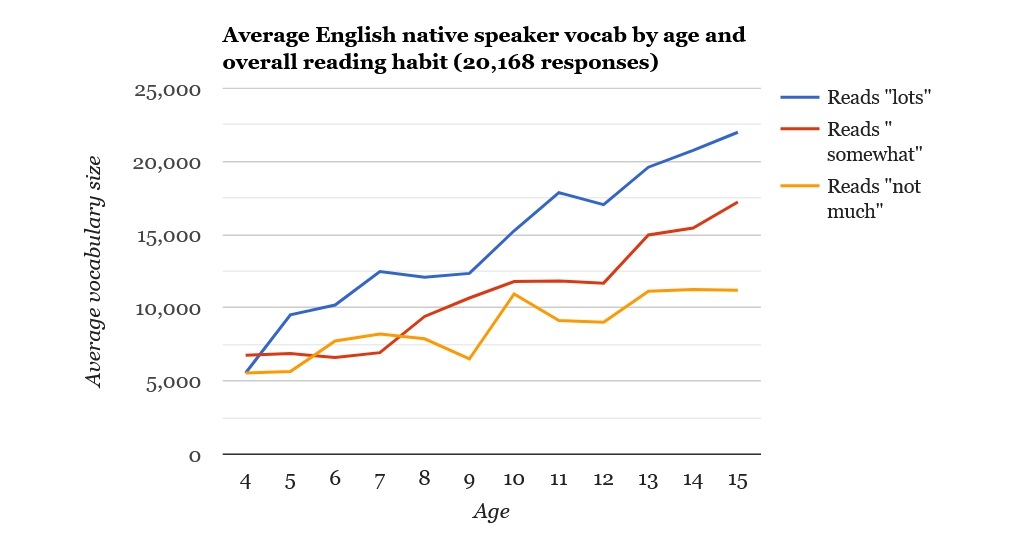
English as a second language: how vocabulary is formed
We have smoothly come to the second part of the article, in which we will look at how vocabulary is built up in people who study English as a foreign language.
The paradigms are radically different.
Learning a language by a native speaker begins as early as infancy, when a child hears phrases in a specific language. At the same time, he stays in the ecosystem of the language 24/7. There are slight differences in bilingual families, but this is only beneficial - children get the opportunity to learn two languages at once for the price of one.
With a foreign language, everything is different. In the vast majority of cases, the ecosystem of the language does not even smell. The study is conducted either in the classroom at school and university, or in courses. That is, they are limited in time and take 2-5 hours a week.
According to the results of the study, this is exactly what the vocabulary of residents of countries in which English is not one of the official languages looks like. That is, all those who study it as a foreigner.
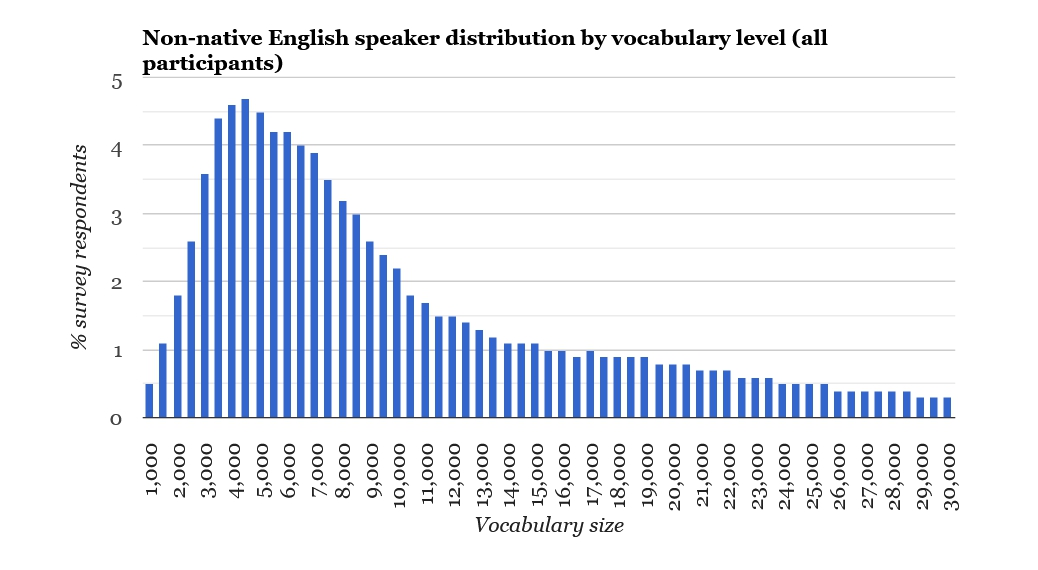
4500 words is the most “popular” vocabulary size. But to be precise, the median passes through 7800 words - half of those tested know more, half - less.
The factors that influence the volume of vocabulary are significantly higher among non-native speakers. The most significant of them:
- time of academic study of the language at school and university;
- time of extracurricular language learning in courses, offline or online;
- using English in everyday life and work (watching movies, listening to music, reading books and the media, working with documents, communicating with English speakers);
- time spent abroad, including living in countries where English is one of the official languages.
And the use of English in practice means much more than academic study.
Those who often use English in their daily life, on average, boast a vocabulary volume of 13,000 words. And those who do not use English anywhere except in language classes, on average, operate with a vocabulary of 6,000 words.
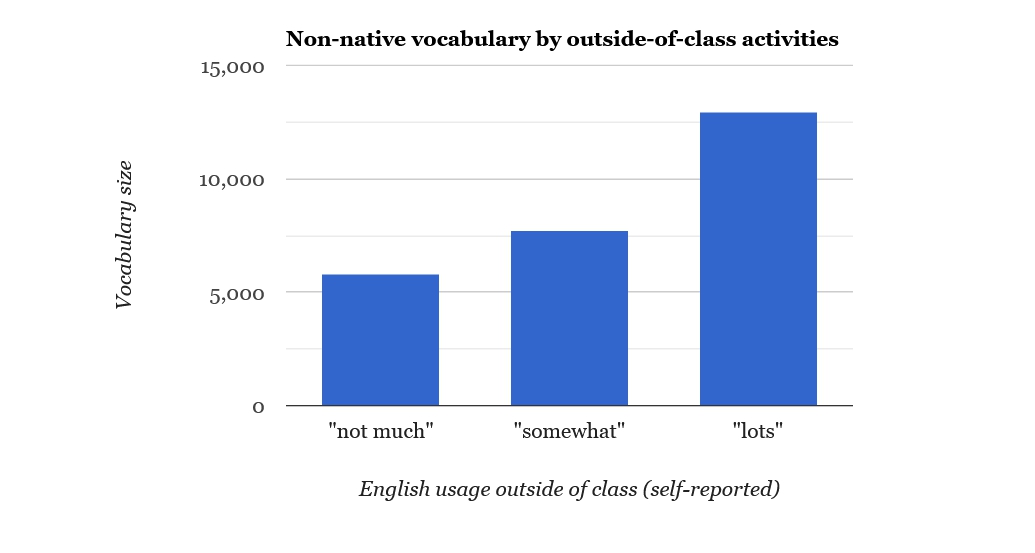
Living abroad in an English-speaking country influences the growth of vocabulary the most.
Placing language in the ecosystem is literally a life-giving kick to the brain. Because English in this case becomes the only way of communication. In fact, the same mechanisms are activated as in native speakers.
, , 2,5 . , , , .
And the longer a non-native English speaker lives in the language ecosystem, the more tangible the result.
The next graph shows how strong the difference is between those who have not been to English-speaking countries, and those who have lived there for less than a year: an average of 7200 and 10,000 vocabulary, respectively.

In modern conditions, it is no longer necessary to move to the United States or Britain for learning English to be productive. There is a concept of an artificial language ecosystem, when a student is formally at home, but the study is organized in such a way that English is used in a variety of situations and almost constantly. And such ecosystems are actively implementing language schools around the world today.
As a result, it turns out that the language ecosystem and reading habits are most influencing the development of vocabulary. The more you put the language into practice and read fiction, the easier it is to memorize new words and phrases and the more complete your active vocabulary. The main thing is to use English every day. Then the progress will be noticeable.
Online school EnglishDom.com - inspiring to learn English through technology and human care

Only for Habr readers, the first lesson with a teacher on Skype is free ! And when you buy classes, you will receive up to 3 lessons for free!
Get a full month of ED Words premium subscription as a gift .
Enter the promo code testyourvocab on this page or directly in the ED Words app . The promo code is valid until 10/02/2021.
Our products:
- Learn English words in the ED Words mobile app
- Learn English from A to Z on the ED Courses mobile app
- Install the extension for Google Chrome, translate English words on the Internet and add them to study in the Ed Words app
- Learn English in a playful way in the online simulator
- Strengthen your speaking skills and find friends in conversation clubs
- YouTube- EnglishDom